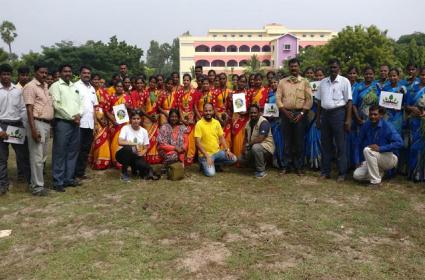Over 2.6 Million Trees Planted To Provide Employment In Rural India During Pandemic

For many of us, 2020 was the year of reckoning when a global pandemic forced us to pause and reassess our relationship with nature. But for rural communities , it was a time of acute economic distress, unemployment and untold hardship. During this unprecedented time, one social enterprise, was not just greening denuded tracts of community land and replenishing water bodies but also supporting rural communities to earn their livelihood with dignity. Over 2.6 million trees were planted in 2020 with the help of locals and migrants that were hit hard by reverse migration. This way, they not only got immediate employment opportunities but could also extract benefits from the fruit, fodder and other forest produce by selling the excess amount in times to come.
The plantation drives also improved the environment in tangible ways. Water tables were expected to rise due to the growing vegetation, conflicts between humans and animals were reduced, and villagers could grow inexpensive fodder for their cattle instead of having to buy it. In different states of India local species of trees were planted in collaboration with corporate partners for the benefit of local topography and communities. Thousands of individuals across the globe also participated in the plantation by virtually adopting these trees and using the unique eTreeCertificates® for sustainable gifting. Near Sariska Tiger Reserve, Dalma Wildlife Sanctuary and various other national sanctuaries and reserve forests, growing more trees has helped the animal habitats to thrive.
Gram Pradhan Devendra Singh shares how plantation drives near Dalma Wildlife Reserve helped the rural communities, "Not only have the trees helped to stop the elephants from raiding our crops, the improved ecosystem gives economic sustenance to villagers. Not to mention, employment opportunities to those who need it most."
Supervisor Surinder Mahto adds, "After the hardship inflicted by COVID-19, the poverty-stricken villagers are finally getting economic sustenance. In my village, here in Jharkhand, over 150 men and women are working in the plantation drive and getting extensive support to earn their living. At a time like this, this work has been of great help to us. Also, the plants will not just help us by providing us with fodder, crops and other produce in the future but also improve the environment. I work here as the supervisor and oversee all the work. Once the plantation work is done, the villagers will continue to take care of the trees and protect them from any foreseeable danger."
Bikrant Tiwary, the CEO of Grow-Trees.com, the organisation behind this movement, says, “We are happy that despite difficulties in 2020, we extended our umbrella of projects to 23 states of India, helped rural communities in their time of need, and generated about 200,000+ workdays for them. We are hopeful of continuing our efforts with even more determination in 2021 and aim to plant 7 million trees in the coming monsoon. What has been most rewarding about this entire process is that at a time when farming and plantation have become mostly mechanised , Grow-Trees.com was able to provide livelihood opportunities to pandemic hit villagers by engaging them in work that not just benefits them but also the environment they live in. "
Grow-Trees.com will continue to support communities in need while also providing individuals and corporates with the opportunity to plant trees in public lands, near wildlife habitats, communal holy places, schools and government-owned deforested or denuded areas. During the pandemic, however, this work acquired an even bigger social dimension. Over 400 households near plantation sites in Maharashtra, were provided with dry ration kits that were sufficient for about 64,000 meals. Training programs in fishery and bee-keeping skills were also ignited to generate immediate employment avenues. In Rajasthan and Uttar Pradesh, old water bodies were expanded and new ones were built to facilitate the daily needs of the rural community members, domestic cattle and other stray animals in the regions



















